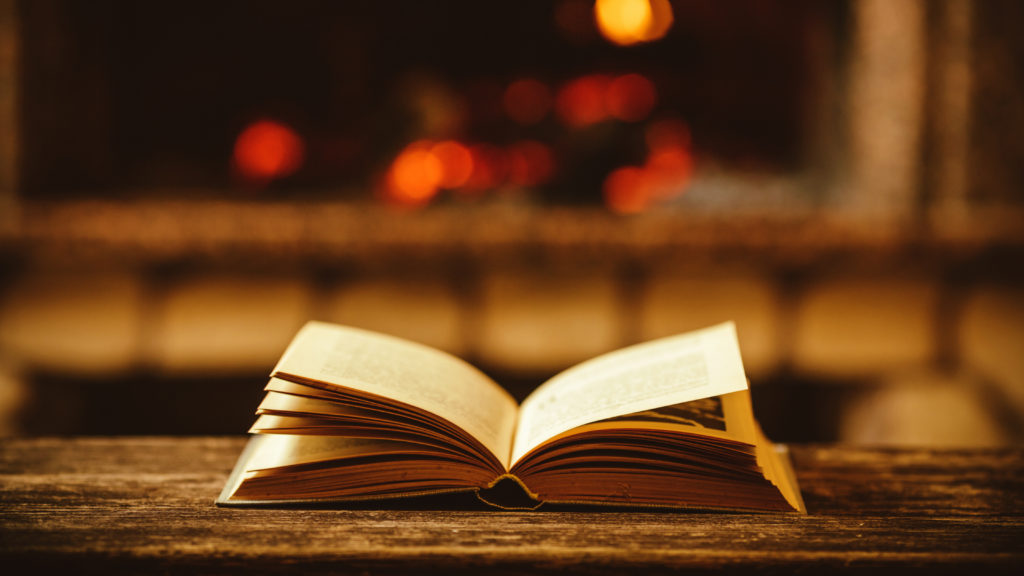From the Polynesian islands to Ancient Greece to Riverside, California, books can truly transport us. Whether you’re traveling or doing a staycation, here’s a list of reads suggested by our staff that can take you places this winter. Check out the list below, and look for them at at your local bookseller.
Hawaiki Rising by Sam Low
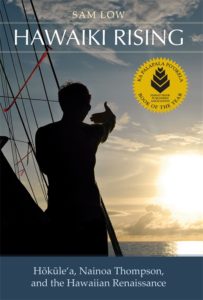 Inspired by attending a session at the recent National Humanities Conference in Hawaii, I’ll be reading Hawaiki Rising by Sam Low (University of Hawaii Press, 2019) an account of the first voyage of the Hōkūleʻa, a modern version of a traditional Polynesian ocean-going canoe built by a crew of courageous and dedicated Hawaiians and guided by a Micronesian island navigator that has sparked the contemporary revival of the ancient and almost-lost art of long-distance seafaring. This voyage and subsequent journeys (currently they are circumnavigating the globe) have led to a resurgence of community and cultural pride among the peoples of Oceania and increased appreciation on the part of people around the world for the extraordinary skills, knowledge, and spirt that enabled the ancestors of Native Hawaiians to travel thousands of miles across uncharted oceans to populate the islands. — Felicia Kelley, Project and Evaluation Director
Inspired by attending a session at the recent National Humanities Conference in Hawaii, I’ll be reading Hawaiki Rising by Sam Low (University of Hawaii Press, 2019) an account of the first voyage of the Hōkūleʻa, a modern version of a traditional Polynesian ocean-going canoe built by a crew of courageous and dedicated Hawaiians and guided by a Micronesian island navigator that has sparked the contemporary revival of the ancient and almost-lost art of long-distance seafaring. This voyage and subsequent journeys (currently they are circumnavigating the globe) have led to a resurgence of community and cultural pride among the peoples of Oceania and increased appreciation on the part of people around the world for the extraordinary skills, knowledge, and spirt that enabled the ancestors of Native Hawaiians to travel thousands of miles across uncharted oceans to populate the islands. — Felicia Kelley, Project and Evaluation Director
On Earth We’re Briefly Gorgeous by Ocean Vuong
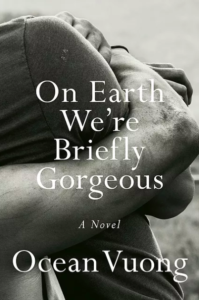 I’m looking forward to finally opening Vietnamese American poet and novelist Ocean Vuong’s debut novel, which seems to be on everyone’s 2019 reading lists! It was a New York Times Bestseller, and has been lauded by writers whose work I have admired, from Viet Thanh Nguyen to Marlon James. How can you not be intrigued by something that has been, somewhat cryptically, described as “a book of sustained beauty and lyricism, earnest and relentless, a series of high notes that trembles exquisitely almost without break…” by the Los Angeles Times? — Claudia Leung, Communications Manager
I’m looking forward to finally opening Vietnamese American poet and novelist Ocean Vuong’s debut novel, which seems to be on everyone’s 2019 reading lists! It was a New York Times Bestseller, and has been lauded by writers whose work I have admired, from Viet Thanh Nguyen to Marlon James. How can you not be intrigued by something that has been, somewhat cryptically, described as “a book of sustained beauty and lyricism, earnest and relentless, a series of high notes that trembles exquisitely almost without break…” by the Los Angeles Times? — Claudia Leung, Communications Manager
The Odyssey by Homer, Translated by Emily Wilson
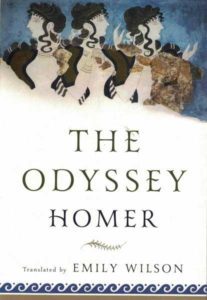 My high school English teacher would be shocked to hear that, lately, my favorite bedtime ritual is to read a chapter of The Odyssey. Newly translated by the poet, classicist, and 2019 MacArthur fellow Emily Wilson, the first woman to bring The Odyssey into English, this translation is written in melodic iambic pentameter. Lean and unpretentious (“Tell me about a complicated man”), Wilson’s translation is the exact same length as the Greek original. Most translations end up significantly longer as new translators add their flourishes. The result is a “fleet-footed” poem that sparkles with beauty. Don’t skip the introduction, a fascinating overview of the themes, origins and controversies of The Odyssey. Wilson stops along the way to correct outdated sexist attitudes which belong more to the 19th century translators than to Homer. The problem of slavery in the Homeric world is also seen afresh in Wilson’s translation, which refuses to use euphemisms like “handmaiden” to describe house slaves, forcing readers to confront the complicated ethics of the poem. — Kirsten Vega, Program Assistant
My high school English teacher would be shocked to hear that, lately, my favorite bedtime ritual is to read a chapter of The Odyssey. Newly translated by the poet, classicist, and 2019 MacArthur fellow Emily Wilson, the first woman to bring The Odyssey into English, this translation is written in melodic iambic pentameter. Lean and unpretentious (“Tell me about a complicated man”), Wilson’s translation is the exact same length as the Greek original. Most translations end up significantly longer as new translators add their flourishes. The result is a “fleet-footed” poem that sparkles with beauty. Don’t skip the introduction, a fascinating overview of the themes, origins and controversies of The Odyssey. Wilson stops along the way to correct outdated sexist attitudes which belong more to the 19th century translators than to Homer. The problem of slavery in the Homeric world is also seen afresh in Wilson’s translation, which refuses to use euphemisms like “handmaiden” to describe house slaves, forcing readers to confront the complicated ethics of the poem. — Kirsten Vega, Program Assistant
In the Country of Women by Susan Straight
Good Night, Mr. Wodehouse by Faith Sullivan
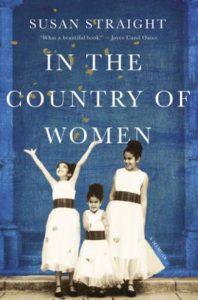 Susan Straight writes a moving, personal memoir about raising her three daughters in Riverside, California, where she still lives and works. “In the end, Straight’s book is about far more than a country of women. It’s an ode to the entire multiracial, transnational tribe she claims as her own… her words are for all those who now call her mother, aunt, cousin and sister, in the neighborhood where she has lived her entire life. And for all those who survived, so these women could live,” says the New York Times.
Susan Straight writes a moving, personal memoir about raising her three daughters in Riverside, California, where she still lives and works. “In the end, Straight’s book is about far more than a country of women. It’s an ode to the entire multiracial, transnational tribe she claims as her own… her words are for all those who now call her mother, aunt, cousin and sister, in the neighborhood where she has lived her entire life. And for all those who survived, so these women could live,” says the New York Times.
Susan also recommended Good Night, Mr. Wodehouse by Faith Sullivan to me, which I’m hoping to read over the holidays. According to Goodreads, “Good Night, Mr. Wodehouse celebrates the power of great novels—from Austen to Chekhov—to transform, console, and teach us the value of friendship and love.” — Julie Fry, President and CEO
Catch and Kill: Lies, Spies, and a Conspiracy to Protect Predators by Ronan Farrow
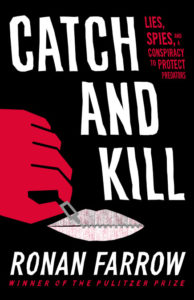 I recently read Pulitzer Prize-winner Ronan Farrow’s Catch and Kill. It’s the background for the articles he ran in The New Yorker about Harvey Weinstein. It’s not an easy read. He goes into some detail about the assaults by Weinstein and other men in the book. If people have read The New Yorker work, this is an interesting contrast in voice. This book is much more personal in tone. It’s revealing of the toll the work took on his life and the extent that the powerful will go to in covering for their own. — Operations Coordinator, Renée Perry
I recently read Pulitzer Prize-winner Ronan Farrow’s Catch and Kill. It’s the background for the articles he ran in The New Yorker about Harvey Weinstein. It’s not an easy read. He goes into some detail about the assaults by Weinstein and other men in the book. If people have read The New Yorker work, this is an interesting contrast in voice. This book is much more personal in tone. It’s revealing of the toll the work took on his life and the extent that the powerful will go to in covering for their own. — Operations Coordinator, Renée Perry

